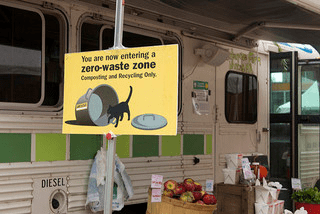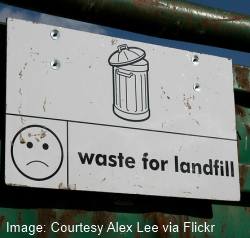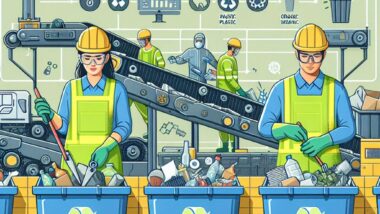The Waster himself has remained a sceptic on the ability of companies to hold true to their bold statements about achieving that utopian aim of “zero waste to landfill” let alone “zero waste”.
We would all like to think that those suffering from “bad neighbour landfills” on their doorstep, will soon wake-up to find their local landfill closed for good with all that means for the return of peacefulness to local roads, and lack of odour risk etc.
In today’s environmentally conscious world, the commitment to sustainability is not just a trend but a necessity. Moy Park, a leading name in the food production industry, has taken a bold step forward by achieving “Zero Waste to Landfill.” This milestone signifies more than just a reduction in waste; it represents a comprehensive approach to environmental stewardship and corporate responsibility. While this achievement has been celebrated, some skeptics remain unconvinced. This article delves into Moy Park’s journey, the significance of reaching zero waste to landfill, and addresses the lingering doubts surrounding this accomplishment.
Understanding Zero Waste to Landfill
Image by Didriks via Flickr
 Zero Waste to Landfill is a sustainability goal where a company ensures that no waste produced from its operations is sent to landfills. Instead, waste is diverted through strategies like recycling, composting, or reusing materials. This approach not only reduces the environmental footprint but also promotes a circular economy where resources are continuously repurposed rather than discarded.
Zero Waste to Landfill is a sustainability goal where a company ensures that no waste produced from its operations is sent to landfills. Instead, waste is diverted through strategies like recycling, composting, or reusing materials. This approach not only reduces the environmental footprint but also promotes a circular economy where resources are continuously repurposed rather than discarded.
Key Components of Zero Waste to Landfill:
- Waste Reduction: Minimizing the amount of waste generated in the first place.
- Recycling and Reuse: Ensuring materials are processed and reused appropriately.
- Composting: Organic waste is converted into natural fertilizers.
- Energy Recovery: Utilizing waste to generate energy where recycling is not feasible.
Moy Park’s Path to Zero Waste
Achieving Zero Waste to Landfill is no small feat. For Moy Park, it required a strategic overhaul of its operations, a commitment to innovation, and the involvement of every employee in the organization. Here’s how Moy Park accomplished this remarkable goal:
Comprehensive Waste Audit
Moy Park began by conducting a thorough waste audit to understand the types and quantities of waste produced. This audit identified key areas where waste could be reduced or repurposed, laying the groundwork for effective waste management strategies.
Investment in Advanced Recycling Technologies
To handle the diverse range of waste generated, Moy Park invested in state-of-the-art recycling technologies. These technologies enabled the company to process materials efficiently, ensuring that recyclable components were effectively segregated and prepared for reuse.
Employee Engagement and Training
A successful zero waste initiative requires the active participation of all employees. Moy Park implemented comprehensive training programs to educate its workforce about waste reduction practices and the importance of their role in achieving zero waste.
Partnerships with Local Recycling Facilities
Collaboration with local recycling facilities was crucial. Moy Park established strong partnerships to ensure that the waste diverted from landfills was processed correctly, supporting the local economy and enhancing community sustainability efforts.
Continuous Monitoring and Improvement
Achieving zero waste is an ongoing process. Moy Park committed to continuous monitoring of its waste management practices, regularly assessing performance, and implementing improvements to maintain and enhance its zero waste status.
The Benefits of Achieving Zero Waste to Landfill
Moy Park’s achievement of zero waste to landfill brings numerous benefits, both environmentally and economically. Understanding these benefits underscores the importance of such initiatives in today’s business landscape.
Environmental Impact
- Reduced Pollution: By diverting waste from landfills, Moy Park minimizes soil and water contamination.
- Conservation of Resources: Recycling and reusing materials help conserve natural resources, reducing the need for raw material extraction.
- Lower Greenhouse Gas Emissions: Proper waste management reduces methane emissions from landfills, mitigating climate change.
Economic Advantages
- Cost Savings: Efficient waste management can lead to significant cost reductions in waste disposal fees.
- Enhanced Brand Reputation: Demonstrating a commitment to sustainability strengthens brand loyalty and attracts environmentally conscious consumers.
- Regulatory Compliance: Proactively managing waste ensures compliance with environmental regulations, avoiding potential fines and penalties.
Social Benefits
- Community Health: Reducing landfill waste lessens the burden on local communities, improving overall public health.
- Job Creation: Investing in recycling and waste management creates jobs within the community, fostering economic growth.
Addressing the Skepticism: Overcoming Doubts
Despite the clear benefits and Moy Park’s transparent efforts, some skeptics question the feasibility and authenticity of achieving zero waste to landfill. Addressing these doubts is essential to maintain trust and demonstrate the genuine impact of this initiative.
Transparency in Reporting
Moy Park has committed to transparent reporting of its waste management practices. By openly sharing data and progress, the company dispels doubts and provides verifiable evidence of its achievements.
Third-Party Audits and Certifications
To validate its zero waste status, Moy Park has undergone third-party audits and obtained relevant certifications. These independent assessments confirm the accuracy of the company’s claims and reinforce credibility.
Continuous Improvement Commitment
Critics often argue that achieving zero waste is a one-time accomplishment rather than an ongoing commitment. Moy Park counters this by emphasizing its dedication to continuous improvement, ensuring that waste reduction remains a priority.
Community Engagement and Feedback
Engaging with the community and stakeholders allows Moy Park to address concerns directly and incorporate valuable feedback into its sustainability strategies. This collaborative approach builds trust and demonstrates accountability.
Community Impact: Closing Local Landfills
One of the most significant outcomes of Moy Park’s zero waste to landfill achievement is the positive impact on local communities, particularly regarding the closure of nearby landfills plagued by poor management and environmental concerns.
Reducing Local Landfill Burden
By diverting waste from landfills, Moy Park alleviates the pressure on local waste management facilities. This reduction can lead to the eventual closure of underperforming landfills, alleviating associated environmental and health issues for neighboring residents.
Enhancing Local Sustainability
The closure of inefficient landfills paves the way for more sustainable waste management practices in the community. This shift encourages other businesses and residents to adopt similar zero waste initiatives, fostering a culture of sustainability.
Protecting Community Health
Minimizing landfill usage mitigates the risk of harmful emissions and environmental contamination, safeguarding the health and well-being of local populations. Cleaner surroundings contribute to a higher quality of life for all community members.
Future Plans and Sustainability Goals
Achieving zero waste to landfill is a monumental step, but Moy Park is not resting on its laurels. The company has ambitious plans to further enhance its sustainability efforts and set new benchmarks in environmental responsibility.
Expanding Recycling Initiatives
Moy Park aims to broaden its recycling initiatives, exploring new materials and technologies to increase the efficiency and scope of its recycling processes. This expansion will ensure even greater waste diversion rates.
Innovation in Packaging
Recognizing that packaging contributes significantly to waste, Moy Park is investing in innovative, sustainable packaging solutions. By reducing packaging materials and using environmentally friendly alternatives, the company strives to minimize its overall waste footprint.
Renewable Energy Integration
To complement its waste management efforts, Moy Park is integrating renewable energy sources into its operations. Utilizing solar, wind, and other renewable energies reduces the company’s reliance on fossil fuels and lowers its carbon footprint.
Community Education Programs
Educating the broader community about waste reduction and sustainability is a priority for Moy Park. Through workshops, seminars, and outreach programs, the company seeks to inspire others to adopt similar zero waste practices.
How You Can Support and Get Involved
Moy Park’s achievement of zero waste to landfill is a collective effort that extends beyond the company itself. There are several ways for individuals, businesses, and communities to support and participate in this sustainability journey.
Partner with Moy Park
Businesses can collaborate with Moy Park to implement zero waste strategies within their operations. By sharing resources and best practices, partners can contribute to a larger impact on waste reduction.
Volunteer for Community Initiatives
Volunteering for local recycling programs or sustainability projects helps strengthen the community’s waste management efforts. Moy Park often organizes and supports such initiatives, providing opportunities for meaningful involvement.
Advocate for Sustainable Policies
Encouraging local and national governments to adopt and enforce sustainable waste management policies is crucial. Advocacy efforts can lead to systemic changes that support zero waste goals on a broader scale.
Adopt Zero Waste Practices at Home
Individuals can make a significant difference by adopting zero waste practices in their daily lives. Simple actions like reducing single-use plastics, recycling properly, and composting organic waste contribute to the overall goal of zero waste to landfill.
Testimonials: Voices of Satisfaction
The impact of Moy Park’s zero waste initiative is best illustrated through the voices of those directly affected by it. Here are some testimonials from community members and partners who have witnessed the positive changes firsthand.
Sarah Thompson, Local Resident:“Since Moy Park achieved zero waste to landfill, our neighborhood has seen a remarkable improvement in air quality and overall cleanliness. It’s inspiring to see a company take such a strong stance on sustainability.”
John Martinez, Business Partner:“Partnering with Moy Park on their zero waste initiative has been a transformative experience for our business. Their commitment and transparency set a high standard for sustainability in the industry.”
Emily Green, Environmental Advocate:“Moy Park’s success in achieving zero waste to landfill is a testament to what can be accomplished with dedication and innovation. It serves as a model for other companies striving to make a positive environmental impact.”
The Road Ahead: Sustaining Momentum
While achieving zero waste to landfill is a significant accomplishment, sustaining this momentum requires ongoing effort, innovation, and collaboration. Moy Park is committed to maintaining its zero waste status and continuously finding new ways to enhance its sustainability practices.
Embracing Technological Advancements
Staying at the forefront of recycling and waste management technologies ensures that Moy Park can adapt to changing circumstances and further reduce its waste output. Investing in research and development is key to achieving long-term sustainability goals.
Engaging Stakeholders
Involving all stakeholders, including employees, partners, and the community, is essential for sustained success. Moy Park fosters an inclusive environment where everyone feels responsible for maintaining and improving waste reduction efforts.
Monitoring Global Trends
Keeping abreast of global sustainability trends allows Moy Park to implement best practices and remain competitive in the industry. By aligning with international standards, the company ensures that its efforts are both effective and recognized worldwide.
Join Moy Park in the Journey Toward a Sustainable Future
Moy Park’s achievement of zero waste to landfill is just the beginning. The company invites individuals and organizations to join in its mission to create a more sustainable future. Whether through partnerships, community involvement, or personal commitment to zero waste practices, everyone has a role to play in this vital endeavor.
Take Action Today:
- Contact Us: Reach out to learn more about Moy Park’s sustainability initiatives and how you can get involved.
- Learn More: Explore our comprehensive sustainability reports and see the tangible impacts of our zero waste efforts.
- Join Our Initiatives: Participate in community programs and volunteer opportunities to support local sustainability projects.
Conclusion
Moy Park’s journey to achieving zero waste to landfill underscores the company’s unwavering commitment to environmental sustainability and corporate responsibility. By implementing comprehensive waste management strategies, investing in innovative technologies, and fostering a culture of continuous improvement, Moy Park has set a new standard in the industry. While some remain skeptical, the tangible benefits and transparent practices demonstrate the authenticity and effectiveness of this initiative. As Moy Park continues to lead the way, it invites everyone to join in creating a sustainable and waste-free future for all.
What do you think about the “Zero Waste” movement? Is Zero Waste to Landfill possible without a huge amount of our waste being incinerated?
Is it genuinely reducing man impact upon the environment or is it just “greenwash” – something which makes it seem as if companies and communities are looking after the environment while in fact they carry on as before?
Please comment to tell us what you think?
[First published 5 June 2014.]







